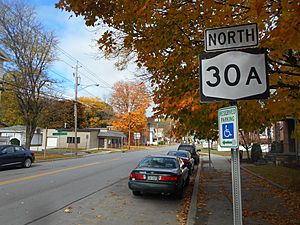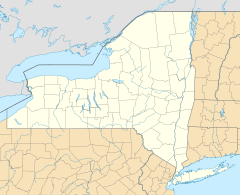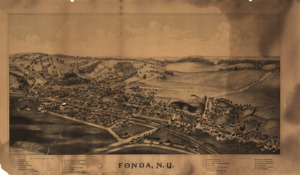Fonda, New York facts for kids
Quick facts for kids
Fonda, New York
|
|
|---|---|
|
Village
|
|

NY30A through Fonda
|
|
| Country | United States |
| State | New York |
| County | Montgomery |
| Incorporated | 1850 |
| Area | |
| • Total | 0.61 sq mi (1.58 km2) |
| • Land | 0.54 sq mi (1.40 km2) |
| • Water | 0.07 sq mi (0.18 km2) |
| Elevation | 295 ft (90 m) |
| Population
(2020)
|
|
| • Total | 668 |
| • Density | 1,239.33/sq mi (478.27/km2) |
| Time zone | UTC-5 (Eastern (EST)) |
| • Summer (DST) | UTC-4 (EDT) |
| ZIP code |
12068
|
| Area code(s) | 518 |
| FIPS code | 36-26462 |
| GNIS feature ID | 0950363 |
Fonda is a small village in Montgomery County, New York, United States. It is also the county seat, which means it's where the county government is located. In 2020, about 668 people lived there.
The village is named after Douw Fonda, an early Dutch-American settler. He was killed in 1780 during the American Revolutionary War, in a raid by the Mohawk tribe who were helping the British.
Fonda is part of the Town of Mohawk. It is located west of the city of Amsterdam. In 1993, the Mohawk people bought land in Fonda to bring back their historic Kanatsiohareke community.
Every August, Fonda hosts the Fonda Fair. This is a popular event that celebrates local agriculture.
Contents
Fonda's Early History
The village of Fonda grew up near an old Mohawk village. This village was called Caughnawaga, or sometimes Kanatsiohareke. The Mohawk people used to grow corn in the flat lands along the north side of the Mohawk River.
In the late 1600s, a young Mohawk woman named Kateri Tekakwitha lived here. She became famous for her strong Catholic faith. Kateri moved to this village after her parents died from smallpox. She survived the disease but had scars on her face. Today, Fonda has a special Catholic shrine dedicated to her. She is the first Native American to be recognized as a saint. After French forces attacked the village, Kateri and many other Catholic Mohawks moved to a new mission village. This new village, called Kahnawake, was in Quebec, Canada.
European settlers, mostly from Germany and England, officially started the modern village of Fonda in 1751. It was built on the site of the old Kanatsiohareke. The village was later named for Douw Fonda. His family are ancestors of famous American actors like Henry Fonda, Jane Fonda, and Peter Fonda. Henry Fonda wrote about his family's history in his autobiography. He mentioned that his family came from Italy, moved to Holland, and then came to America. They traveled up the Hudson River to the Mohawk village of Caughnawaga.
Fonda's Growth and Development
After the Erie Canal opened in 1825, Fonda became a busy place. The canal helped transport goods and people across New York. This made trade and travel much easier. Fonda became known for making cheese, as dairy farming was big in the area.
When the railroad arrived in 1835, Fonda grew even more. It helped move goods and people faster across the state. Because Fonda was the county seat, it benefited from all this new activity. The village officially became a town in 1850.
In the mid to late 1900s, the NASCAR racing series held four races at the local Fonda speedway. These races were part of an event called the Fonda 200.
Two important historical sites in Fonda are recognized nationally. The Caughnawaga Indian Village Site was added to the National Register of Historic Places in 1973. It's the only Mohawk village in the country that has been fully studied by archaeologists. The Walter Butler Homestead was also listed on the National Register in 1976.
The Kanatsiohareke Community
In 1993, a Mohawk leader named Tom Porter helped bring the Mohawk people back to the valley. He bought land near Fonda to grow corn and other crops. Other Mohawk people joined him, and they named their new community Kanatsiohareke. This name means "The Place of the Clean Pot." It refers to a large, deep hole in the creek bed.
This was the first time the Mohawk people owned land in the valley since 1783. That's when they were forced to leave after the American Revolutionary War.
Geography of Fonda
Fonda is located at coordinates 42°57′16″N 74°22′32″W / 42.95444°N 74.37556°W.
The village covers about 0.6 square miles (1.58 square kilometers). Most of this area is land, with a small part being water.
Fonda sits on the north bank of the Mohawk River. Across the river is the Village of Fultonville.
Several main roads pass through Fonda. These include New York State Route 5, New York State Route 30A, and New York State Route 334. The Amtrak train line, called the Empire Corridor, also goes through Fonda. However, there isn't a train station in the village. People who want to take the train usually go to Troy.
Population Information
| Historical population | |||
|---|---|---|---|
| Census | Pop. | %± | |
| 1870 | 1,092 | — | |
| 1880 | 944 | −13.6% | |
| 1890 | 1,190 | 26.1% | |
| 1900 | 1,145 | −3.8% | |
| 1910 | 1,100 | −3.9% | |
| 1920 | 2,208 | 100.7% | |
| 1930 | 1,170 | −47.0% | |
| 1940 | 1,123 | −4.0% | |
| 1950 | 1,026 | −8.6% | |
| 1960 | 1,004 | −2.1% | |
| 1970 | 1,120 | 11.6% | |
| 1980 | 1,006 | −10.2% | |
| 1990 | 1,007 | 0.1% | |
| 2000 | 810 | −19.6% | |
| 2010 | 795 | −1.9% | |
| 2020 | 668 | −16.0% | |
| U.S. Decennial Census | |||
According to the 2000 census, there were 810 people living in Fonda. About 29.9% of households had children under 18. The average household had 2.29 people.
The population was spread out by age:
- 25.4% were under 18 years old.
- 8.0% were between 18 and 24.
- 28.1% were between 25 and 44.
- 19.4% were between 45 and 64.
- 19.0% were 65 years or older.
The median age in the village was 36 years.
See also
 In Spanish: Fonda (Nueva York) para niños
In Spanish: Fonda (Nueva York) para niños
 | Calvin Brent |
 | Walter T. Bailey |
 | Martha Cassell Thompson |
 | Alberta Jeannette Cassell |



